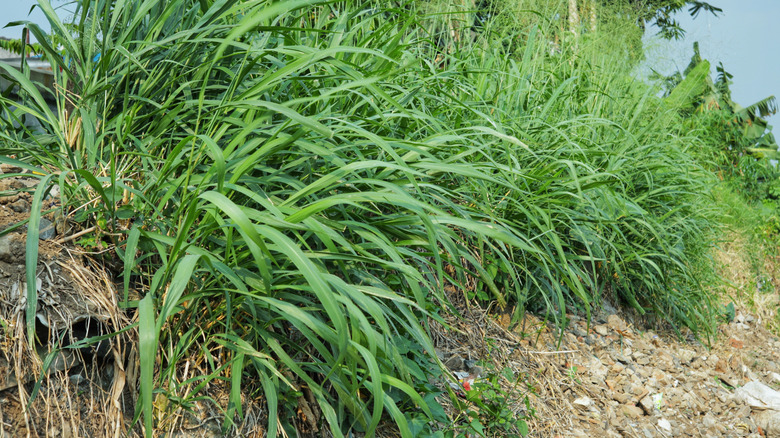The Mosquito-Repelling Grass Variety That Can Also Help Repel Pesky Wasps
Warmer months offer the perfect time to get outdoors and spend relaxing evenings on the porch or playing in the backyard. That is, until you step outside and find out wasps have taken over your yard. These annoying and sometimes dangerous pests are enough to make you want to stay indoors all summer and fall. But what if there were an easy-to-plant grass variety that could help keep these insects at bay? While it may not repel every last mosquito or wasp, Cymbopogon nardus, better known as citronella grass, has a strong scent that wasps and mosquitoes find unpleasant, deterring them from the immediate vicinity.
The reasons bugs steer clear of citronella grass lie in the oils found in the plant, namely citronellal, citronellol, and geraniol. These oils mask scents that attract pests, and are thought to disrupt their sensory receptors, making them unable to detect carbon dioxide and heat. When mosquitoes can't detect heat or carbon dioxide, they struggle to find a host (you) to feed on. Since using citronella grass only deters and doesn't kill insects, you don't have to worry about it adversely affecting the honeybee population, making it the perfect solution for responsible insect control.
How (& where) to plant citronella grass
Citronella grass is a tall perennial that grows in clumps, reaching 5 to 8 feet tall and 3 to 5 feet wide. It thrives in full sun to partial shade, but also prefers to be shielded from afternoon sunlight to prevent scorching of the grass blades. Citronella grows best in US hardiness zones 9 to 11. However, that doesn't mean you can't take advantage of its mosquito- and wasp-repelling properties if you live in cooler areas — simply grow it in a container and bring it indoors during the winter months before temperatures dip below 32 degrees Fahrenheit. If you'd rather plant it in the ground, you can, but it will act as an annual, dying off when temperatures hit freezing.
Since the scent of citronella repels bugs, you need to be within a close distance of the plant to reap its benefits. This makes location crucial. Add this plant to the outdoor areas you use most often, like the porch, patio, or deck, or near play areas for children. You can also boost the protection by using infused products, such as candles or citronella oils, to repel wasps and mosquitoes.

